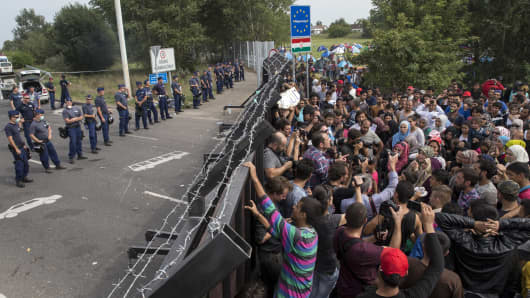
Source: CNBC
Europe's refugee crisis could boost the region's
sagging growth by forcing governments to ramp up public expenditure,
according to European Economic and Financial Affairs Commissioner Pierre
Moscovici.
The refugee crisis has divided public opinion and raised doubts over the future of the European Union's (E.U) key tenets but governments have also stepped up investments to provide assistance for the new arrivals. This spending could underpin demand as doubts grow over the efficacy of further monetary stimulus at a time some interest rates in the euro zone are already below zero.
"This is a very emotional crisis and it is a political challenge of high importance, but if I look at the economics and just the economics, I'm persuaded that this can be an opportunity capable of driving 0.2 to 0.3 percent additional growth," Moscovici told CNBC over the weekend in an interview.
After years of being hit by the region's multi-year sovereign debt crisis, government finances in the euro zone are also on the mend.
The euro zone's combined government deficit is set to fall to 1.9 percent of gross domestic product (GDP) this year, from an estimated 2.2 percent in 2015, according to the European Commission.
"Why? Due to the fact that we, especially Germany, have to address the welcoming and the integration of those who are moving away from regimes threatening their lives."
The refugee crisis has divided public opinion and raised doubts over the future of the European Union's (E.U) key tenets but governments have also stepped up investments to provide assistance for the new arrivals. This spending could underpin demand as doubts grow over the efficacy of further monetary stimulus at a time some interest rates in the euro zone are already below zero.
"This is a very emotional crisis and it is a political challenge of high importance, but if I look at the economics and just the economics, I'm persuaded that this can be an opportunity capable of driving 0.2 to 0.3 percent additional growth," Moscovici told CNBC over the weekend in an interview.
After years of being hit by the region's multi-year sovereign debt crisis, government finances in the euro zone are also on the mend.
The euro zone's combined government deficit is set to fall to 1.9 percent of gross domestic product (GDP) this year, from an estimated 2.2 percent in 2015, according to the European Commission.
"Why? Due to the fact that we, especially Germany, have to address the welcoming and the integration of those who are moving away from regimes threatening their lives."
These support measures include providing refugees with
formal employment opportunities, basic income support, housing, health
care, education as well as an overhaul of the European Union's asylum
policy and improvement of border controls.
In total, these efforts could cost the region $45 billion annually over the next three-five years, according to estimates by billionaire George Soros, chairman of Soros Fund Management, in a recent opinion piece on the Project Syndicate website. Governments should take advantage of the E.U.'s AAA credit rating and borrow to meet those needs since if spent upfront, the funds would produce a positive multiplier effect across the economy, explained the hedge fund pioneer.
Germany has already projected additional public spending worth 0.5 percent of GDP in 2016 to roll out assistance for migrants. For Austria and Sweden, that number stands at 0.3 and 0.9 percent, respectively.
58-year old Moscovici stressed the importance of those spending measures.
"The problem that still exists in the E.U. is that we suffer from an investment gap, we need to invest more in the future."
Like Moscovici, the Organization for Economic Co-operation and Development (OECD) believes these expenses will be beneficial in the long term.
In total, these efforts could cost the region $45 billion annually over the next three-five years, according to estimates by billionaire George Soros, chairman of Soros Fund Management, in a recent opinion piece on the Project Syndicate website. Governments should take advantage of the E.U.'s AAA credit rating and borrow to meet those needs since if spent upfront, the funds would produce a positive multiplier effect across the economy, explained the hedge fund pioneer.
Germany has already projected additional public spending worth 0.5 percent of GDP in 2016 to roll out assistance for migrants. For Austria and Sweden, that number stands at 0.3 and 0.9 percent, respectively.
58-year old Moscovici stressed the importance of those spending measures.
"The problem that still exists in the E.U. is that we suffer from an investment gap, we need to invest more in the future."
Like Moscovici, the Organization for Economic Co-operation and Development (OECD) believes these expenses will be beneficial in the long term.
No comments:
Post a Comment